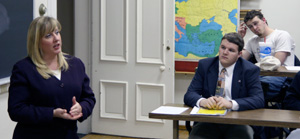More than 30 Wabash students turned out Tuesday night for the first in a series of alcohol education talks.. The Wabash Acts Responsibly (W.A.R.) Council has planned a succession of six speakers, the "W.A.R. 6-Pack" aimed at educating students in safety and responsibility.
 Heather Perkins, a local attorney, works her to keep youth out of jail. The topic of the night’s discussion was "Party Smart: Learning how not to get caught up with the Law". Instead of the stereotypical scene of a police officer or authority figure showing diagram after diagram to dozing students, Perkins put a hot topic on the table.
Heather Perkins, a local attorney, works her to keep youth out of jail. The topic of the night’s discussion was "Party Smart: Learning how not to get caught up with the Law". Instead of the stereotypical scene of a police officer or authority figure showing diagram after diagram to dozing students, Perkins put a hot topic on the table.
"Almost everything I have to deal with in courts here stems from alcohol and drug use," Perkins said. The attention was captured immediately; and with an air close to an older sister, the attorney rattled off the essential information of Operating Under the Influence and Minor Consumption. "The ‘point-08’ is it," she cautioned the room, "there will be no question about it in the courts. There is no way around it. Once you’re past it, you’re past it."
When there is suspicion of drinking and driving, every police officer in the state of Indiana will administer the same series of tests. "The one legged stand, the HGN (only moving the eyes), and the walk and turn will all be administered to a person suspected of drinking and driving," she said. "You can refuse to take the tests; but of course, you forfeit your license for a year."
The crowd listened eagerly to the tragic penalties of alcohol abuse and misuse.
Perkins covered the most common questions. ‘If there is a designated driver with intoxicated passengers, can they be pulled over?’ Yes, if the authorities have any probable cause (an improper turn signal or lane merge) they can pull the car over and ask people to get out of the car. ‘Where exactly can I be picked up for public intoxication?’ Just about anywhere that is deemed public: public roads or sidewalks, parks, even parking lots.
 Even though the majority of the presentation focused on unlawful acts committed by ordinary citizens, the speaker made herself clear on abuse of authority. "I’m not a proponent of ‘getting away with what I can,’ but, I want to hold the law to a higher level." Explaining when Miranda Rights are to be read, and when substance tests are to administered, Perkins gave the classroom the resources to be prepared to assert their rights.
Even though the majority of the presentation focused on unlawful acts committed by ordinary citizens, the speaker made herself clear on abuse of authority. "I’m not a proponent of ‘getting away with what I can,’ but, I want to hold the law to a higher level." Explaining when Miranda Rights are to be read, and when substance tests are to administered, Perkins gave the classroom the resources to be prepared to assert their rights.
After a quick recap, the attention moved from the speaker to the students.. "Don’t I have the right to tell the police they can’t search my car," one student asked. "Yes," she began, "you have the right to deny the search. But more than likely, they will tell you to find a ride because they will keep your car and wait for a search warrant."
The feeling of the room wasn’t one of "Where is the line, and how can I cross it?" Instead, the approach was more open and informative. Anyone who had a question could ask, without feeling intimidated or awkward.
Perkins thought the W.A.R. Councils 6-Pack idea is a tremendous one. "It’s a tremendous opportunity. I hope my speaking makes some students stop and think before they do anything they might regret. It’s always good to ask about possibilities and not feel threatened."
Andrew Forrester, the president of W.A.R., hopes that the "6-Pack" will, "encourage discussion to provide insight," for students and faculty alike."
Photos by Steve Abbott '09